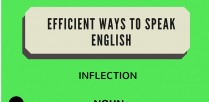One of my students often makes mistakes with word order, so here is a new lesson for you about how to observe these rules.
|
A |
The first and the primary rule is: subject, then the verb, followed by the object: | |
|
Subject |
Verb |
Object | ||
|
They |
Speak | English. | ||
|
Who |
has read | this book? | ||
|
Your sister |
is | early today. | ||
|
Margaret |
follows | the rules of word order. | ||
They speak English.
Who has read this book?
Your sister is early today.
Margaret follows the rules of word order.
|
B |
The second rule is: place before time. | |
They speak English at school (place) every day (time).
Your sister went to bed (place) early today (time).
Have you been to the library (place) today (time)?
Margaret follows the rule of the word order every day (time).
The other rules are easier, so we will achieve our learning goals!
|
C |
The third rule: place adverbs before the verb. | |
Adverbs to do with time: always, usually, already, sometimes etc.
Other adverbs: also, both, all.
|
|
 |
|
| They also play football. | He usually goes to bed at 9 pm. |
|
|
|
 |
|
| We both live in the USA. | I often go to the theater with my friends. |
|
|
D |
With the verb “to be”, we place adverbs after the verb: | |
I am always on time.
You are never late.
Hans is also at school now.
They are both students.
|
E |
When we have two verbs in one phrase, we place the adverb between them: | |
|
|
 |
|
| I will always love you. | Sorry, but we can never avoid the rules. |
|
|
|
 |
|
| You can always go to the cinema with your friends. | They can also enjoy the play; just invite them with you. |
|
What next?
|
F |
If we ask questions, we put the auxiliary verb before the subject, and then we place the main verb: | |
Do you like dogs?
Does Jim have a cat?
Does your school have central heating?
What do you do?
Do they remember their college friends after twenty-five years?
|
G |
If we have the verb to be, at the start of the question, we place it before subject (then we put the main verb if we are using a continuous tense): | |
Are you ready?
Is he going to China?
Where are they?
How are you?
Are we singing today? Let’s go!
|
H |
The same rule applies to past simple, continuous, future simple, present simple/continuous and perfect tenses: | |
Did your friend call you back?
Were you downtown when that happened?
Was he walking down the street when you called him?
Was Tom reading the book when Jerry interrupted him?
Will we agree to accept that offer?
Will you be my girlfriend?
Do you think about the film?
Has he saved all of you?
What are you doing now?
|
I |
When we have negatives, we put the auxiliary verb and “not” (or other negatives such as “never” and “nothing”) before the subject: | |
Anna doesn’t want to eat ice-cream.
Fred is not going to China; he is going to Chicago.
We will not accept their offer because they do not look honest.
Nadine wasn’t going to stop her speech.











